They also offer a respite from driving on Lebanon’s largely lawless, potholed roads, where mopeds hurtle in all directions and traffic lights are scarce.
The system officially launched last July, during more than a year of hostilities between Israel and militant group Hezbollah that later slammed the brakes on some services.
Ali Daoud, 76, who remembers Lebanon’s long-defunct trains and trams, said the public bus was “orderly and organised” during his first ride.
The World Bank’s Beirut office told AFP that Lebanon’s “reliance on private vehicles is increasingly unsustainable”, noting rising poverty rates and vehicle operation costs.
Ziad Nasr, head of Lebanon’s public transport authority, said passenger numbers now averaged around 4,500 a day, up from just a few hundred at launch.
He said authorities hope to extend the network, including to Beirut airport, noting the need for more buses, and welcoming any international support.
France donated around half of the almost 100 buses now in circulation in 2022.
Consultant and transport expert Tammam Nakkash said he hoped the buses would be “a good start” but expressed concern at issues including the competition.
Private buses and minivans — many of them dilapidated and barrelling down the road at breakneck speed — cost similar to the public buses.
Shared taxis are also ubiquitous, with fares starting at around $2 for short trips.
Several incidents of violence targeted the new public buses around their launch last year.
Environment
Student and worker Daniel Imad, 19, said he welcomed the idea of public buses but had not tried them yet.
